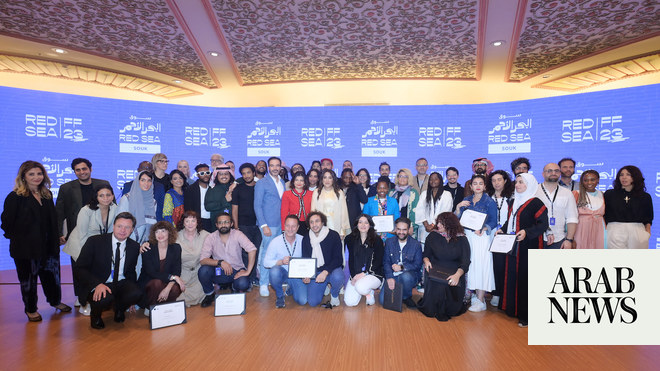
JEDDAH — The Red Sea International Film Festival (RSIFF) announced that its inaugural session, which will launch next month in Jeddah’s Old Town, would have the theme “Changing the script”.
The festival announced the honoring of three creators of change and innovation in their countries, who made great contributions to the world of film.
They are Jack Lang, former French Minister of Culture, Kim Dong-ho, founder of South Korea’s Busan Film Festival, and Daniela Michel, founding director of the Morelia International Film Festival in Mexico.
Festival director Mahmoud Sabbagh commented: "The honoring of these three legendary figures is at the heart of the Red Sea Film Festival"s goals. An appreciation of pioneers of the film industry, who contributed to unlocking artistic capabilities of their compatriots and developing cinematic masterpieces to be enjoyed for generations."
Sabbagh added, "It coincides with the founding moment of the film industry in our country, and in honoring these individuals looks at how the introduction of similar international models can add to the dialogue establishing Saudi’s film industry."
Three Gold Yusr awards will be presented at the opening ceremony of the Red Sea Film Festival on March 12 to our trio of honorees who embody the spirit of “Change the Script.”
Film industry pioneers and movie fans will gather in Jeddah to exchange thoughts and ideas and to discuss the prospects for change that the Festival"s programs and initiatives carry.
This theme was chosen to reflect the atmosphere in which the festival came to be, and cinema"s ability to document and respond to these social changes. This theme is related specifically to Saudi Arabia as a new film market, and to celebrate cinema’s ability to impact a community.
Jack Lang (France): Appointed Minister of Culture by President Mitterrand in 1981, Jack Lang has made an unparalleled impact over the creative landscape of France. He created a revolution in the film sector, where he worked to develop a profitable infrastructure for the French film industry.
Lang redefined the state"s involvement in cinema production with the restructuring of existing funds, a strategy that paid off handsomely. He oversaw the creation of the French National Cinema Center and the Independent Film Support Fund, establishing new funds such as the Mass Production Film Fund. His innovative idea, known as the SOFICA funds, which are private money funds, was the crown jewel of his plans.
Many countries have since copied the funding model, and its programs have benefited many generations of directors, including New Wave giants, Godard, Truffaut, Rivette, Chabrol and Rohmer.
Kim Dong-ho (South Korea): A giant of Korean cinema, Kim Dong-ho is the founder and former Chairman of the Busan International Film Festival (BIFF), launched in 1996, it developed into Asia’s premier film event, a central hub for the Asian film industry and a global film destination.
Since the first edition of the Busan Film Festival, its openness to the public, and its ability to create a large audience enjoying diverse cinematic offerings have had a huge impact on the Korean film industry.
Throughout his career, he has made significant contributions to shaping Korea’s cultural landscape. One example, from 1988, he was president of the Korean Motion Picture Promotion Corporation (now Korean Film Council), contributing to the expansion of the cultural scene, deepening the base of the Korean film industry, and establishing Korean films as a global force.
Daniela Michel (Mexico): Daniela Michel is the founding director of the International Morelia Film Festival, established in 2003 as an annual festival to support a new generation of Mexican directors, and credited with the rise of Mexican cinema internationally.
The direct result of this is the prominence of a new generation of Mexican filmmakers that is winning major prizes and gaining a permanent place in major film festival competitions. Collectively they have come to be known as "The Second Golden Age” of Mexican cinema.
In addition, The Morelia Festival has acquired a prestigious international reputation, while also playing a central and important role at the heart of the Mexican film industry.











